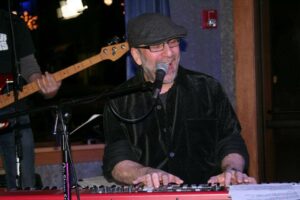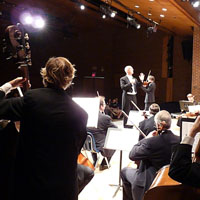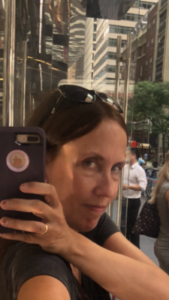Our author brings us up to date on her own gradual return to good health after falling ill with coronavirus–and shares the harrowing but similarly miraculous journeys to recovery experienced by, as it happens, two well-known, Chappaqua-based musicians.
During this terrible time in American history, we brace ourselves to digest the latest news each day as to how many fellow New Yorkers are suffering and dying; this week, public officials announced well over 10,000 had died in New York City alone. It’s a tragic, frightening statistic, and as Governor Andrew Cuomo regularly reminds us, there are real faces behind the numbers and devastated families who cannot properly care for those hospitalized or later deceased or adequately address their own grief.
But every day, there are also more than twice as many people recovering from COVID-19, the novel coronavirus.
As dire as the situation certainly is, it’s important to remember, too, that many New York residents are also getting better, and many experts predict at least a year of subsequent immunity follows, although inadequate widespread testing remains an ongoing challenge.
A few weeks past my own last symptoms, solidly recovered from COVID-19, Mount Sinai Hospital scheduled myself and my 18-and-up family members to donate plasma.
I feel very lucky.
I can walk into the pharmacy without fear and get takeout coffee without fearing invisible germs on the cup. And when I line up outside the grocery store. I’m meticulous about social distancing–but that’s because I don’t want to worry anyone else, not because I worry about myself.
There are more and more of us every day–the recovering and the recovered. (Editor’s Note: The jury is still out on the degree of immunity to coronavirus infection, post recovery too. Please speak with your doctor.)
We’re not all young, either. I’m 50, and the Chappaqua residents I interviewed for this article– by phone, because both were not totally well yet–are a bit older. I also have a minor heart condition and asthma.
People always want to know more about my asthma so here’s a description that, under normal circumstances, would be oversharing and plus would bore you to tears: I’ve had asthma since I was seven.
My asthma is idiopathic, meaning that there’s no known cause. I’m on the highest dose of Symbicort, twice daily, and use my albuterol rescue inhaler more than I’m supposed to. Not a day goes by that I don’t think, several times, about my difficult breathing.
Yes, my heart condition was exacerbated by the virus–that’s why I was hospitalized and tested. But my lungs remained clear while hospitalized, and when I developed more significant shortness of breath a few days later at home, I wasn’t worried.
As a lifelong asthmatic, I know when to worry, and it just didn’t get that bad.
The editor asked me to share my recovery story as a follow up to my ‘being sick’ story https://www.theinsidepress.com/area-journalist-diagnosed-covid-19-positive-and-quarantined-with-family/ but also to speak with two members of the Chappaqua community, both of whom happen to be accomplished musicians who had contracted coronavirus. Each had become seriously ill, but each also appears to have fortunately recovered as well. She asked if I’d check in with them:
Jon Cobert: “My Wife Tried to Revive Me… then she Called 911”

I personally never lost my sense of taste and smell, which has become one of the telltale signs of coronavirus, but my husband and two of my sons did.
So did this Chappaqua resident, music legend Jon Cobert. His wife and son caught the virus as well, and they too lost their senses of taste and smell.
Cobert, 65, a five-time Grammy nominated musician who has played with John Lennon, Tom Chapin, Harry Chapin, Laura Branigan and many others, first called his doctor in mid-March. “I had a headache and a fever on March 16 after dinner, and I kind of knew,” he said, adding that he doesn’t usually get headaches or fevers, and his doctor said to keep an eye on things.
When Cobert developed a cough, though, his doctor arranged for him to have his lungs looked at on March 20, and he was tested. He got the call that the test was positive on March 23.
Cobert said he had been hoping he didn’t have it, although he recalled having worked with two musicians who later tested positive as well. His doctor said he should take his temperature and call to come in if he became very short of breath. At first, he was tired with a productive cough; but then he developed gastrointestinal symptoms.
A few days later, he passed out while sitting at the kitchen table.
“I just felt all the energy drain out of my body,” he said. “My wife tried to revive me, and then she called 911.”
Cobert said the Chappaqua Ambulance Corps was there in less than five minutes. He was taken to Northern Westchester Hospital and treated for atrial fibrillation. “They were fantastic,” he said.
Unfortunately, that overnight stay wasn’t the last Cobert saw of the hospital. On March 28, he developed chest pains and shortness of breath, and had to return.
But he was once more cleared to return home, and now his heart rate is, according to his Apple Watch, normal.
While Tylenol was hard to find, Cobert’s family was able to find generic acetaminophen. His sister-in-law gave him an oxygen meter, and he had an inhaler left over from a bout of bronchitis in the fall that he used a few times.
As of early this week, Cobert was feeling back to his normal self. “I went for a walk yesterday and it was quite therapeutic,” he said. “It was nice to get outside for an extended period and get some exercise. I highly recommend it.”
He even did his first Facebook live performance to the delight of his fans. He plans to do it weekly every Thursday.
Michael Shapiro Thought About “the Love I Feel for the People in my Life”


Composer and conductor Michael Shapiro, 69, also spent time at Northern Westchester Hospital, five days, he shared, due to COVID-19-caused pneumonia, which he described as “feeling like having broken-up concrete in the bottom of my lungs.”
“They took wonderful care of me,” he said of the hospital staff. “They could not have been better. My long time doctor, Marvin Chinitz, was particularly insightful and I think saved my life.”
Shapiro, the former music director of the Chappaqua Orchestra, said he had fever as well. “I’d feel better, then it would spike, I’d feel better again, and the same thing happened. It would spike up again,” he said.
“I was constantly thinking about the things I believe in… the love I feel for the people in my life, all my family members, the things I still need to do,” Shapiro said, describing his time battling the virus.
This year’s Passover Seder, Shapiro said, was particularly meaningful as the fight between good and evil and against tyranny became less abstract for him, the Biblical made real as families hunkered down in their homes, the Angel of Death in the form of coronavirus raging across the world.
On a local level, Shapiro said he and his longtime partner Marge Perlin, her two sons and their girlfriends, most of whom tested positive but with relatively mild symptoms, depended on treasured friends and community members, who helped them in many ways.
Shapiro is on the mend now, gathering strength. Public music making is now restricted to commercial and public radio where Shapiro’s works, particularly his new Archangel Concerto for Piano and Orchestra (recorded last May by Steven Beck, pianist, and the BBC National Orchestra of Wales) is being broadcast internationally, on BBC3, CBC, and radio stations across America. SiriusXM is featuring Shapiro’s music on its program Living American to be broadcast six times and downloadable the next three months.
Shapiro is starting to get back to work on a new violin concerto for virtuoso Tim Fain which they hope to record when the lights go on again.
He credits his return to good health with the support he received within the community, especially. He mentioned: “Richard Leroy, dynamically leading social action at Temple Shaaray Tefila, who arranged for two weeks of meal delivery during the household’s quarantine; Vinny Milazzo of the Village Market, who energetically provides curbside service; and Erin Teter, manager of the Quaker Hill Tavern, whose loving example is an inspiration.”
“They are special, special people and community members,” Shapiro said of Leroy, Milazzo, and Teter. “We love them, they are curing the world every day, and we hope the community supports and cares for what they do.”



